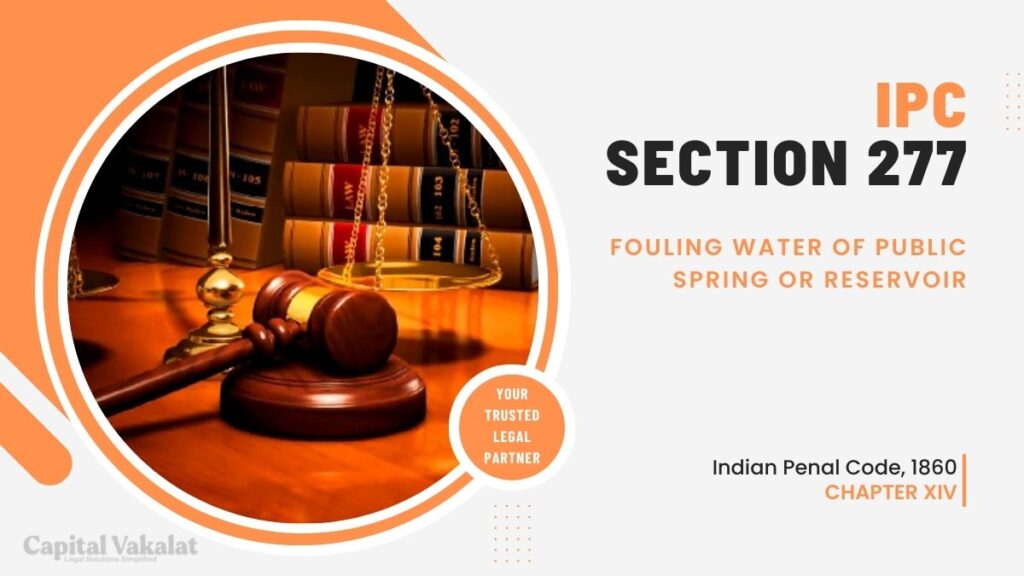Water is a precious resource, and its contamination or pollution can have severe consequences on public health and the environment. In India, the Indian Penal Code (IPC) addresses various offenses related to public order and health, including Section 277, which deals with fouling water in public springs or reservoirs.

This article explores Section 277 IPC, its significance, legal implications, and the need for its enforcement.
Understanding Section 277 of the Indian Penal Code
Section 277 of the Indian Penal Code is a legal provision aimed at safeguarding the purity of water sources meant for public use. It states that “whoever voluntarily corrupts or fouls the water of any public spring or reservoir, so as to render it less fit for the purpose for which it is ordinarily used, shall be punished with imprisonment of either description for a term which may extend to three months or with a fine which may extend to five hundred rupees, or with both.”
This provision underscores the importance of maintaining the integrity of public water sources and penalizes individuals who knowingly contaminate or pollute them.
The Importance of Public Springs and Reservoirs
Public springs and reservoirs play a crucial role in providing clean and safe drinking water to communities, especially in rural areas. These sources are often the lifelines of villages and towns, and their water is essential for daily consumption, irrigation, and various other domestic purposes.
Offenses Under Section 277 IPC
Under Section 277 IPC, several actions can be considered offenses, including:
- Dumping waste or pollutants into public springs or reservoirs.
- Intentionally contaminating the water source with harmful substances.
- Neglecting maintenance, leading to water source deterioration.
These actions are punishable as they endanger public health and deprive communities of a vital resource.
Punishments and Legal Consequences
Section 277 IPC prescribes punishments for those found guilty of fouling public water sources. The offenders can face imprisonment of up to three months, a fine of up to five hundred rupees, or both. This penalty is intended to deter individuals from indulging in such harmful activities and to ensure the sanctity of public water sources.
Historical Context and Significance
The inclusion of Section 277 in the Indian Penal Code dates back to its enactment during the colonial era. It reflects the concern of the British administration for maintaining public health and ensuring access to clean water for the people. Even today, the provision continues to be relevant as water remains a fundamental need.
Environmental Impacts
Fouling of public springs and reservoirs has severe environmental repercussions. It can lead to the contamination of groundwater, harm aquatic ecosystems, and affect the biodiversity of the area. It also contributes to water scarcity issues and can result in long-term damage to the environment.
Measures for Prevention and Conservation
Preventing fouling of public water sources is a collective responsibility. Communities and local authorities should take the following measures:
- Regular monitoring and maintenance of public springs and reservoirs.
- Implementation of laws and regulations to protect water sources.
- Raising public awareness about the importance of water conservation.
Public Awareness and Responsibilities
It is vital for individuals to recognize the significance of preserving public springs and reservoirs. Everyone can contribute by:
- Avoiding activities that could pollute water sources.
- Reporting any incidents of contamination to the authorities.
- Supporting local initiatives for water resource protection.
Conclusion
Section 277 IPC plays a crucial role in safeguarding public water sources and ensuring access to clean and safe drinking water. The fouling of public springs and reservoirs is a serious offense with legal consequences, reflecting the importance of preserving these vital resources. It is essential for communities and individuals to take responsibility for water resource protection to maintain the integrity of public water sources.
Frequently Asked Questions
What actions can be considered offenses under Section 277 IPC?
Actions such as dumping waste or pollutants into public springs or reservoirs, intentionally contaminating the water source, and neglecting maintenance can be considered offenses under this section.
What are the legal consequences of fouling public water sources under Section 277 IPC?
Offenders can face imprisonment of up to three months, a fine of up to five hundred rupees, or both as legal consequences.
Why is it important to prevent fouling of public water sources?
Preventing fouling is essential to safeguard public health, protect the environment, and ensure access to clean water for communities.
How can individuals contribute to the protection of public springs and reservoirs?
Individuals can contribute by avoiding activities that could pollute water sources, reporting incidents of contamination, and supporting local initiatives for water resource protection.